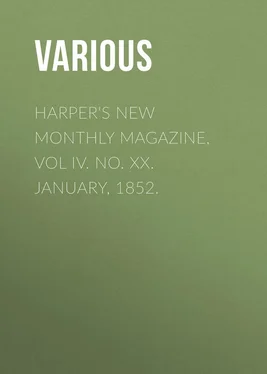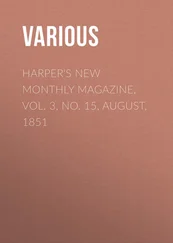Various - Harper's New Monthly Magazine, Vol IV. No. XX. January, 1852.
Здесь есть возможность читать онлайн «Various - Harper's New Monthly Magazine, Vol IV. No. XX. January, 1852.» — ознакомительный отрывок электронной книги совершенно бесплатно, а после прочтения отрывка купить полную версию. В некоторых случаях можно слушать аудио, скачать через торрент в формате fb2 и присутствует краткое содержание. Издательство: Иностранный паблик, Жанр: periodic, foreign_edu, на английском языке. Описание произведения, (предисловие) а так же отзывы посетителей доступны на портале библиотеки ЛибКат.
- Название:Harper's New Monthly Magazine, Vol IV. No. XX. January, 1852.
- Автор:
- Издательство:Иностранный паблик
- Жанр:
- Год:неизвестен
- ISBN:нет данных
- Рейтинг книги:3 / 5. Голосов: 1
-
Избранное:Добавить в избранное
- Отзывы:
-
Ваша оценка:
- 60
- 1
- 2
- 3
- 4
- 5
Harper's New Monthly Magazine, Vol IV. No. XX. January, 1852.: краткое содержание, описание и аннотация
Предлагаем к чтению аннотацию, описание, краткое содержание или предисловие (зависит от того, что написал сам автор книги «Harper's New Monthly Magazine, Vol IV. No. XX. January, 1852.»). Если вы не нашли необходимую информацию о книге — напишите в комментариях, мы постараемся отыскать её.
Harper's New Monthly Magazine, Vol IV. No. XX. January, 1852. — читать онлайн ознакомительный отрывок
Ниже представлен текст книги, разбитый по страницам. Система сохранения места последней прочитанной страницы, позволяет с удобством читать онлайн бесплатно книгу «Harper's New Monthly Magazine, Vol IV. No. XX. January, 1852.», без необходимости каждый раз заново искать на чём Вы остановились. Поставьте закладку, и сможете в любой момент перейти на страницу, на которой закончили чтение.
Интервал:
Закладка:
The “Battle of the Pyramids,” as Napoleon characteristically designated it, sent a thrill of terror, far and wide, into the interior of Asia and Africa. These proud, merciless, licentious oppressors were execrated by the timid Egyptians, but they were deemed invincible. In an hour they had vanished, like the mist, before the genius of Napoleon.
The caravans which came to Cairo, circulated through the vast regions of the interior, with all the embellishments of Oriental exaggeration, most glowing accounts of the destruction of these terrible squadrons, which had so long tyrannized over Egypt, and the fame of whose military prowess had caused the most distant tribes to tremble. The name of Napoleon became suddenly as renowned in Asia and in Africa as it had previously become in Europe. But twenty-one days had elapsed since he placed his foot upon the sands at Alexandria, and now he was sovereign of Egypt. The Egyptians also welcomed him as a friend and a liberator. The sheets of flame, which incessantly burst from the French ranks, so deeply impressed their imaginations, that they gave to Napoleon the Oriental appellation of Sultan Kebir, or King of Fire.
The wives of the Mamelukes had all remained in Cairo. Napoleon treated them with the utmost consideration. He sent Eugene to the wife of Mourad Bey, to assure her of his protection. He preserved all her property for her, and granted her several requests which she made to him. Thus he endeavored, as far as possible, to mitigate the inevitable sufferings of war. The lady was so grateful for these attentions that she entertained Eugene with all possible honors, and presented him, upon his departure, with a valuable diamond ring.
Cairo contained three hundred thousand inhabitants. Its population was brutal and ferocious in the extreme. The capital was in a state of terrible agitation, for the path of Oriental conquerors is ever marked with brutality, flames, and blood. Napoleon immediately dispatched a detachment of his army into the city to restore tranquillity, and to protect persons and property from the fury of the populace. The next day but one, with great pomp and splendor, at the head of his victorious army, he entered Cairo, and took possession of the palace of Mourad Bey. With the most extraordinary intelligence and activity he immediately consecrated all his energies to promote the highest interest of the country he had conquered. Nothing escaped his observation. He directed his attention to the mosques, the harems, the condition of the women, the civil and religious institutions, the state of agriculture, the arts, and sciences – to every thing which could influence the elevation and prosperity of the country. He visited the most influential of the Arab inhabitants, assured them of his friendship, of his respect for their religion, of his determination to protect their rights, and of his earnest desire to restore to Egypt its pristine glory. He disclaimed all sovereignty over Egypt, but organized a government to be administered by the people themselves. He succeeded perfectly in winning their confidence and admiration. He immediately established a congress, composed of the most distinguished citizens of Cairo, for the creation of laws and the administration of justice, and established similar assemblies in all the provinces, which were to send deputies to the general congress at Cairo. He organized the celebrated Institute of Egypt, to diffuse among the people the light and the sciences of Europe. Some of the members were employed in making an accurate description and a perfect map of Egypt; others were to study the productions of the country, that its resources might be energetically and economically developed; others were to explore the ruins, thus to shed new light upon history; others were to study the social condition of the inhabitants, and proper plans for the promotion of their welfare, by the means of manufactures, canals, roads, mills, works upon the Nile, and improvements in agriculture. Among the various questions proposed to the Institute by Napoleon, the following may be mentioned as illustrative of his enlarged designs: Ascertain the best construction for wind and water mills; find a substitute for the hop, which does not grow in Egypt, for the making of beer; select sites adapted to the cultivation of the vine; seek the best means of procuring water for the citadel of Cairo; select spots for wells in different parts of the desert; inquire into the means of clarifying and cooling the waters of the Nile; devise some useful application of the rubbish with which the city of Cairo, and all the ancient towns of Egypt, are encumbered; find materials for the manufacture of gunpowder. It is almost incredible that the Egyptians were not acquainted with windmills, wheelbarrows, or even handsaws, until they were introduced by Napoleon. Engineers, draughtsmen, and men of science immediately dispersed themselves throughout all the provinces of Egypt. Flour, as fine as could be obtained in Paris, was ground in mills at Alexandria, Rosetta, Damietta, and Cairo. By the erection of public ovens, bread became abundant. Hospitals were established, with a bed for each patient. Saltpetre and gunpowder-mills were erected. A foundry was constructed with reverberating furnaces. Large shops were built for locksmiths, armorers, joiners, cartwrights, carpenters, and rope-makers. Silver goblets and services of plate were manufactured. A French and Arabic printing-press was set at work. Inconceivable activity was infused into every branch of industry. The genius of Napoleon, never weary, inspired all and guided all. It was indeed a bright day which, after centuries of inaction and gloom, had thus suddenly dawned upon Egypt. The route was surveyed, and the expense estimated, of two ship-canals, one connecting the waters of the Red Sea with the Nile at Cairo; the other uniting the Red Sea with the Mediterranean across the Isthmus of Suez. Five millions of dollars and two years of labor would have executed both of these magnificent enterprises, and would have caused a new era to have dawned upon three continents. It is impossible not to deplore those events which have thus consigned anew these fertile regions to beggary and to barbarism. The accomplishment of these majestic plans might have transferred to the Nile and the Euphrates those energies now so transplendent upon the banks of the Mississippi and the Ohio. “It is incredible,” says Talleyrand, “how much Napoleon was able to achieve. He could effect more than any man, yes, more than any four men whom I have ever known. His genius was inconceivable. Nothing could exceed his energy, his imagination, his spirit, his capacity for work, his ease of accomplishment. He was clearly the most extraordinary man that I ever saw, and I believe the most extraordinary man that has lived in our age, or for many ages.” All the energies of Napoleon’s soul were engrossed by these enterprises of grandeur and utility. Dissipation could present no aspect to allure him. “I have no passion,” said he, “for women or gaming. I am entirely a political being.”
The Arabs were lost in astonishment that a conqueror, who wielded the thunderbolt, could be so disinterested and merciful. Such generosity and self-denial was never before heard of in the East. They could in no way account for it. Their females were protected from insult; their persons and property were saved. Thirty thousand Europeans were toiling for the comfort and improvement of the Egyptians. They called Napoleon the worthy son of the prophet, the favorite of Allah. They even introduced his praises into their Litany, and chanted in the mosques, “Who is he that hath saved the favorite of Victory from the dangers of the sea, and from the rage of his enemies? Who is he that hath led the brave men of the West, safe and unharmed to the banks of the Nile! It is Allah! the great Allah! The Mamelukes put their trust in horses; they draw forth their infantry in battle array. But the favorite of Victory hath destroyed the footmen and the horsemen of the Mamelukes. As the vapors which rise in the morning are scattered by the rays of the sun, so hath the army of the Mamelukes been scattered by the brave men of the West. For the brave men of the West are as the apple of the eye to the great Allah.”
Читать дальшеИнтервал:
Закладка:
Похожие книги на «Harper's New Monthly Magazine, Vol IV. No. XX. January, 1852.»
Представляем Вашему вниманию похожие книги на «Harper's New Monthly Magazine, Vol IV. No. XX. January, 1852.» списком для выбора. Мы отобрали схожую по названию и смыслу литературу в надежде предоставить читателям больше вариантов отыскать новые, интересные, ещё непрочитанные произведения.
Обсуждение, отзывы о книге «Harper's New Monthly Magazine, Vol IV. No. XX. January, 1852.» и просто собственные мнения читателей. Оставьте ваши комментарии, напишите, что Вы думаете о произведении, его смысле или главных героях. Укажите что конкретно понравилось, а что нет, и почему Вы так считаете.












